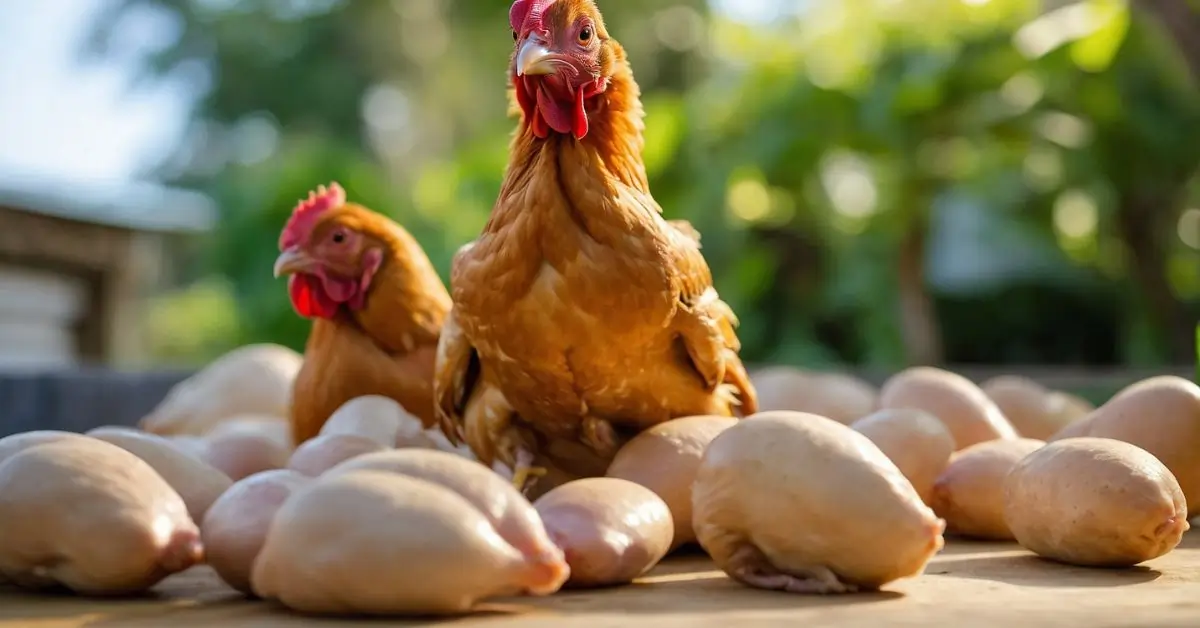What Does Organic Chicken Mean
In recent years, there has been a significant rise in demand for organic chicken as consumers become more health-conscious and environmentally aware. Understanding what “organic” means is crucial for making informed choices about the food we eat. Organic chicken isn’t just about avoiding chemicals; it encompasses a holistic approach to farming that emphasizes animal welfare, sustainable practices, and superior nutrition.
In this post, we will delve into the ten ultimate standards that define organic chicken. You’ll learn about the stringent requirements for organic feed, humane living conditions, and the prohibition of antibiotics and hormones. We’ll also explore the benefits of choosing organic chicken, including its impact on your health and the environment. By the end of this article, you’ll have a clear understanding of what sets organic chicken apart and why it’s worth considering for your diet.
Defining Organic Chicken
Overview of Organic Certification
Organic chicken is raised according to specific guidelines set forth by national and international certification bodies. These guidelines ensure that the chickens are raised in a way that promotes their health and welfare, while also supporting environmental sustainability. Organic certification involves rigorous standards for farming practices, including the types of feed used, the living conditions of the chickens, and the prohibition of certain chemicals and additives. To be labeled as organic, farms must undergo regular inspections and audits to ensure compliance with these standards.
Difference Between Organic and Conventional Chicken

The key differences between organic and conventional chicken lie in their farming practices and overall quality:
- Feed: Organic chickens are fed organic, non-GMO feed that is free from synthetic pesticides and fertilizers. Conventional chickens may be fed a diet containing GMOs and synthetic additives.
- Antibiotics and Hormones: Organic certification prohibits the use of antibiotics and growth hormones. Conventional farming often uses these substances to promote faster growth and prevent disease.
- Living Conditions: Organic chickens must have access to the outdoors and be able to engage in natural behaviors. Conventional chickens are typically raised in confined spaces with limited access to the outdoors.
- Pesticides: The use of synthetic pesticides is prohibited in organic farming, whereas conventional farming may utilize these chemicals to manage pests and weeds.
- Animal Welfare: Organic standards require humane treatment of animals, including proper space, shelter, and conditions that promote their well-being. Conventional farming practices may not prioritize animal welfare to the same extent.
Regulatory Bodies and Certification Standards
Several regulatory bodies oversee organic certification to ensure that standards are consistently met:
- USDA (United States Department of Agriculture): The USDA’s National Organic Program (NOP) sets the standards for organic farming in the United States. Farms and products must meet these standards to be certified organic.
- EU Organic Certification: In the European Union, organic farming is regulated by the EU Organic Regulation. Products must comply with these regulations to carry the EU organic label.
- IFOAM (International Federation of Organic Agriculture Movements): IFOAM sets international standards for organic farming and provides guidelines for certification bodies worldwide.
- Certifying Agencies: Various certifying agencies, such as Quality Assurance International (QAI) and Oregon Tilth, conduct inspections and audits to ensure that farms comply with organic standards.
The 10 Ultimate Standards for Organic Chicken
1. Organic Feed
Organic chickens must be fed organic feed that is free from synthetic pesticides, fertilizers, and GMOs. The feed should come from certified organic crops, ensuring that the chickens receive clean, natural nutrition.
Benefits of Organic Feed:
Organic feed supports the chickens’ health, promoting better growth and development. It reduces the risk of contamination from harmful chemicals and enhances the nutritional quality of the chicken meat for consumers.
2. No Antibiotics or Hormones
The use of antibiotics and growth hormones is strictly prohibited in organic chicken farming. This ensures that chickens grow naturally without artificial enhancements.
Impact on Chicken Health and Human Consumption:
Chickens raised without antibiotics and hormones are healthier and less likely to develop antibiotic-resistant bacteria. Consumers benefit from safer, more natural meat without exposure to potentially harmful substances.
3. Outdoor Access
Organic standards require that chickens have access to the outdoors, allowing them to engage in natural behaviors such as pecking, scratching, and foraging.
Benefits for Chicken Welfare:
Outdoor access improves the chickens’ physical and mental well-being, reducing stress and promoting healthier growth. It also results in higher-quality meat with better texture and flavor.
4. Living Conditions
Organic chickens must be provided with humane living conditions that include adequate space, proper ventilation, and access to clean water and nutritious food.
Comparison to Conventional Farming Practices:
Conventional farming often involves crowded and confined spaces, which can lead to higher stress levels and increased disease risk. Organic standards ensure a more humane and healthier environment for the chickens.
5. No GMOs
Organic chicken feed must not contain genetically modified organisms (GMOs). This ensures that the feed is natural and free from any genetic engineering.
Importance of Non-GMO Standards:
Avoiding GMOs supports a more natural diet for chickens and aligns with consumers’ preferences for clean, unaltered food sources. It also helps maintain biodiversity and supports sustainable farming practices.
6. Pesticide-Free Environment
Organic chicken farming restricts the use of synthetic pesticides in feed and farming environments. Only natural and non-toxic pest control methods are allowed.
Health and Environmental Benefits:
A pesticide-free environment reduces the risk of chemical residues in the meat, promoting better health for both chickens and consumers. It also protects the soil, water, and surrounding ecosystems from harmful chemical runoff.
7. Natural Behavior
Organic standards require that chickens be allowed to express their natural behaviors. This includes pecking, dust bathing, and social interaction.
Examples and Benefits:
Allowing chickens to engage in natural behaviors leads to lower stress levels, improved health, and better overall welfare. It also results in higher-quality meat that is more nutritious and flavorful.
8. Animal Welfare Standards
Organic farming includes comprehensive animal welfare standards that ensure the humane treatment of chickens. These standards cover all aspects of their care, from housing and feeding to health care and handling.
Certification and Compliance Monitoring:
Regular inspections and audits are conducted to ensure that farms comply with these welfare standards. This provides assurance to consumers that the chickens are raised in a humane and ethical manner.
9. Sustainable Farming Practices
Organic chicken farming emphasizes sustainable and eco-friendly practices that protect the environment and promote long-term agricultural health.
Long-Term Benefits for the Environment:
Sustainable practices, such as crop rotation, composting, and reduced chemical use, help maintain soil health, reduce pollution, and support biodiversity. These practices ensure that farming remains productive and environmentally responsible for future generations.
10. Traceability and Transparency
Organic certification includes strict requirements for traceability and transparency, ensuring that consumers can trust the origin and quality of their chicken.
Importance of Traceability in Organic Farming:
Traceability allows for the tracking of chickens from farm to table, providing assurance that they meet organic standards. Transparency in farming practices builds consumer trust and confidence in organic products.
Benefits of Choosing Organic Chicken
Health Benefits for Consumers
- Reduced Exposure to Chemicals: Organic chicken is free from synthetic pesticides, antibiotics, and growth hormones. This minimizes consumers’ exposure to harmful chemicals and reduces the risk of antibiotic resistance.
- Higher Nutritional Value: Studies suggest that organic chicken may contain higher levels of essential nutrients, such as omega-3 fatty acids, vitamins, and minerals, compared to conventionally raised chicken. These nutrients are vital for maintaining overall health and well-being.
- Lower Risk of Contaminants: Organic farming practices reduce the risk of contamination with harmful bacteria and toxins. This makes organic chicken a safer choice, particularly for vulnerable populations like children, pregnant women, and the elderly.
Environmental Advantages
- Reduced Pollution: Organic farming methods prohibit the use of synthetic pesticides and fertilizers, which can pollute soil and water. By choosing organic chicken, consumers support farming practices that are less harmful to the environment.
- Enhanced Biodiversity: Organic farms often use crop rotation, cover cropping, and other sustainable practices that promote biodiversity. These methods help maintain healthy ecosystems and protect wildlife habitats.
- Soil Health: Organic farming emphasizes the use of natural fertilizers and compost, which improve soil health and fertility. Healthy soil is crucial for sustainable agriculture and long-term food security.
Improved Animal Welfare
- Humane Treatment: Organic certification standards require that chickens be raised in humane conditions, with adequate space, shelter, and the ability to engage in natural behaviors like foraging and dust bathing. This reduces stress and improves the overall quality of life for the animals.
- Outdoor Access: Organic chickens must have access to the outdoors, where they can roam freely and exhibit natural behaviors. This contrasts with conventional farming, where chickens are often confined to crowded indoor spaces.
- Better Living Conditions: Organic farms must provide chickens with clean, spacious environments that meet their physical and psychological needs. This results in healthier, less stressed animals and, ultimately, higher-quality meat.
Supporting Sustainable Farming Practices
- Eco-Friendly Methods: Organic farming practices prioritize sustainability and environmental stewardship. This includes reducing chemical inputs, conserving water, and enhancing soil fertility. These practices help mitigate climate change and protect natural resources for future generations.
- Local Economies: By choosing organic chicken, consumers often support local and small-scale farmers who prioritize sustainable practices. This helps strengthen local economies and promotes a more resilient food system.
- Long-Term Sustainability: Organic farming practices are designed to be sustainable over the long term. They focus on maintaining healthy soil, reducing pollution, and conserving biodiversity. Supporting organic agriculture helps ensure a sustainable food supply for future generations.
Frequently Asked Questions
Q- What is organic chicken?
A- Organic chicken is raised without synthetic pesticides, antibiotics, or GMOs, following strict organic farming standards.
Q- How is organic chicken different from regular chicken?
A- Organic chicken is fed organic feed, given outdoor access, and raised without antibiotics or hormones, unlike regular chicken.
Q- Does organic chicken have better living conditions?
A- Yes, organic chickens have better living conditions with more space and outdoor access.
Q- Where can I buy organic chicken?
A- You can buy organic chicken at supermarkets, farmers’ markets, online retailers, and local organic farms.
Conclusion
Choosing organic chicken means opting for healthier, more nutritious meat that supports sustainable farming and better animal welfare. By understanding what “organic” truly means and the standards that define it, you can make informed decisions that benefit your health and the environment. Whether you’re looking for superior taste, improved nutrition, or ethical farming practices, organic chicken offers a compelling choice. Embrace the benefits of organic chicken and contribute to a healthier future for yourself and the planet.
